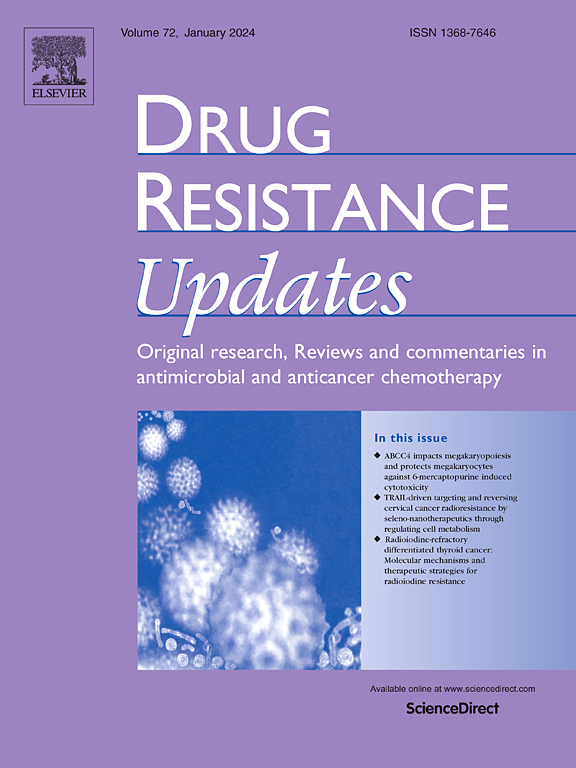模拟禁食饮食通过抑制NRAS-和igf1介导的mTORC1信号传导,增强CDK4/6抑制剂对乳腺癌的抗肿瘤作用。
IF 15.8
1区 医学
Q1 PHARMACOLOGY & PHARMACY
引用次数: 0
摘要
模拟禁食饮食(FMD)周期,定义为3-5天的卡路里限制、低蛋白、低碳水化合物和高脂肪饮食周期,已成为延缓自体移植和异种移植小鼠模型癌症发生和进展的饮食方法,也是一种安全可行的方法,可以降低人类癌症和其他年龄相关病理的危险因素。大量针对各种肿瘤类型的临床前研究表明,禁食/FMDs可以增强各种标准治疗癌症疗法的疗效,但也可以调节免疫系统,促进T细胞依赖性肿瘤细胞的攻击。重要的是,将药物治疗与禁食/ fmd结合可以克服经常出现的获得性耐药,并降低长期治疗效果。然而,口蹄疫恢复对CDK4/6i耐药性的机制仍然知之甚少。在这里,Li和同事提供的证据表明,口蹄疫周期作为一个不确定因素,可以降低包括IGF-1、RAS、AKT和mTOR-S6K在内的信号网络的活性,从而延缓癌症进展并逆转耐药性的获得。这些发现扩大了对FMD介导的药物疗效增加的机制理解,并为支持激素治疗、CDK4/6抑制剂和FMD联合治疗乳腺癌的试验提供了进一步的证据。这些关于口蹄疫周期的新结果为延长因获得性耐药而最终无效的标准治疗药物的疗效增添了乐观的前景。本文章由计算机程序翻译,如有差异,请以英文原文为准。
Fasting-mimicking diet potentiates anti-tumor effects of CDK4/6 inhibitors against breast cancer by suppressing NRAS- and IGF1-mediated mTORC1 signaling
Fasting-mimicking diet (FMD) cycles, defined as 3–5 day periods of a calorie-restricted, low-protein, low-carbohydrate, and high-fat diet, have emerged as a dietary approach to delay cancer initiation and progression in both autograft and xenograft mouse models and as a safe and feasible approach to decrease risk factors for cancer and other age-related pathologies in humans. A substantial number of pre-clinical studies focused on various tumor types have shown that fasting/FMDs can potentiate the efficacy of various standard-of-care cancer therapies but also modulate the immune system to promote a T cell-dependent attack of tumor cells. Importantly, combining drug treatment with fasting/FMDs can overcome acquired drug resistance which frequently emerges and reduces long-term treatment benefits. However, the mechanisms by which the FMD reverts resistance to CDK4/6i remain poorly understood. Here, Li and colleagues provide evidence that FMD cycles act as a wild card to reduce the activity of a signaling network that includes IGF-1, RAS, AKT, and mTOR-S6K to delay cancer progression and reverse the acquisition of drug resistance.
These findings expand the mechanistic understanding of the FMD-mediated increase in drug efficacy and provide further evidence to support trials combining hormone therapy, CDK4/6 inhibitors, and FMD in breast cancer treatment. These new results on FMD cycles add an optimistic outlook to extend the efficacy of standard-of-care drugs that eventually become ineffective because of acquired resistance.
求助全文
通过发布文献求助,成功后即可免费获取论文全文。
去求助
来源期刊

Drug Resistance Updates
医学-药学
CiteScore
26.20
自引率
11.90%
发文量
32
审稿时长
29 days
期刊介绍:
Drug Resistance Updates serves as a platform for publishing original research, commentary, and expert reviews on significant advancements in drug resistance related to infectious diseases and cancer. It encompasses diverse disciplines such as molecular biology, biochemistry, cell biology, pharmacology, microbiology, preclinical therapeutics, oncology, and clinical medicine. The journal addresses both basic research and clinical aspects of drug resistance, providing insights into novel drugs and strategies to overcome resistance. Original research articles are welcomed, and review articles are authored by leaders in the field by invitation.
Articles are written by leaders in the field, in response to an invitation from the Editors, and are peer-reviewed prior to publication. Articles are clear, readable, and up-to-date, suitable for a multidisciplinary readership and include schematic diagrams and other illustrations conveying the major points of the article. The goal is to highlight recent areas of growth and put them in perspective.
*Expert reviews in clinical and basic drug resistance research in oncology and infectious disease
*Describes emerging technologies and therapies, particularly those that overcome drug resistance
*Emphasises common themes in microbial and cancer research
 求助内容:
求助内容: 应助结果提醒方式:
应助结果提醒方式:


